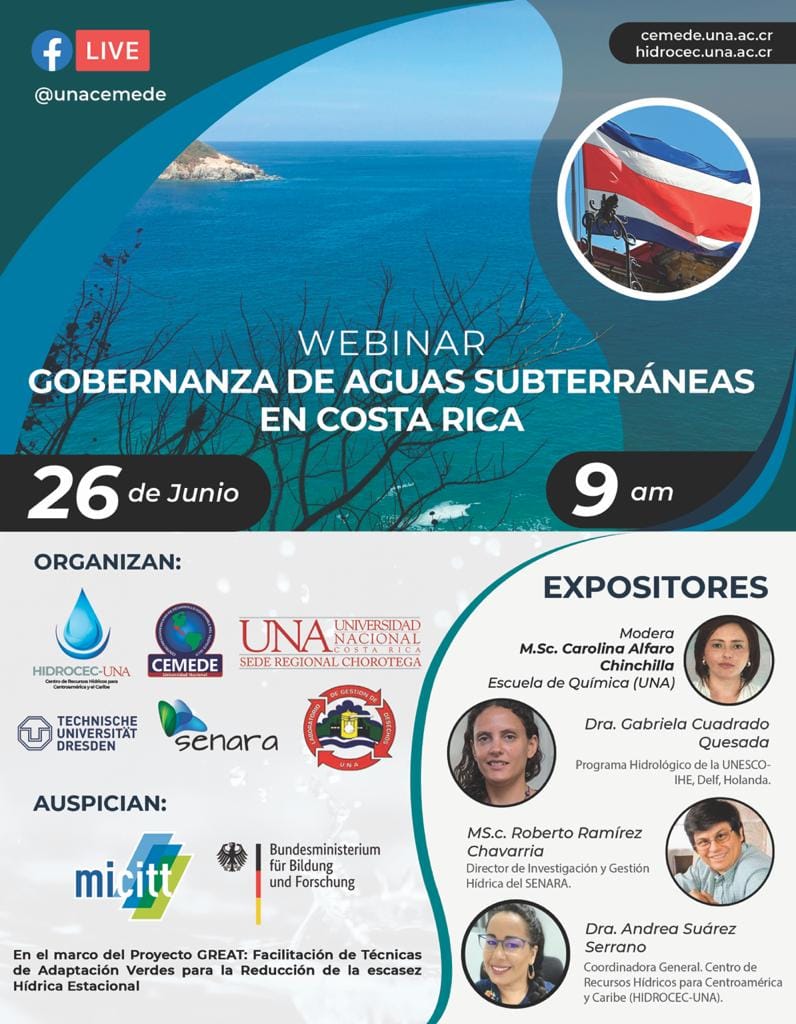Experts from the Universidad Nacional Costa Rica (UNA), the National Service for Groundwater, Irrigation and Drainage (SENARA) and IHE Delft Institute for Water Education discussed the main challenges related to groundwater governance to support water security in Costa Rica. Gathered in a virtual seminar, four governance experts exchanged ideas and needs to achieve greater water security, highlighting the need to strengthen groundwater governance processes in the Central American region.

Dr. Gabriela Cuadrado Quesada from IHE Delft, Netherlands, highlighted the need to revise the concept of governance to facilitate a reality where decisions are not centralised and imposed in the traditional vertical and normative scheme that prevails in the region. She clarified that the concept of governance can be considered as “the practices of coordination and decision-making between different actors on water-related disputes”. According to Gabriela Cuadrado, it is necessary for communities and water users to really participate in the decision-making process to improve water management because the real problem with respect to water management is the unequal distribution of the resource.
Mr. Roberto Ramírez Chavarría, director of Research and Water Management at SENARA, said that it is necessary to distinguish between the concepts of governance and governability, since governance often results in imposition while governance is the collaborative commitment of users and communities to manage water. Likewise, Mr. Ramírez shared that this vision has been put into practice in SENARA’s work with the organisation of the Plans for the Sustainable Use of Aquifers (PAS), which have become spaces to promote participatory governance and reduce water disputes in hot areas of the country such as the coast of Santa Cruz. The SAP processes combine a process of generating and understanding technical information and involving local water users to improve water resource management.
Mrs. Erylin Chaverri Alvarado, Executive Director of the Federation of Communal Water Management Societies – Federación de Sociedades Administradoras de Acueductos Comunales (ASADAS) of Abangares, Cañas, Bagaces and Tilarán, shared her experiences as a regional representative of the national water governance mechanism of the Tempisque North Pacific Hydrological Unit. According to Chaverri, this mechanism has facilitated the organization of meetings that bring together various actors of importance for water resource management, which identify and prioritize the needs for attention and the most relevant projects of the Costa Rican public institutions. In addition, Chaverri said that in conjunction with the Water Directorate of MINAE, a regional forum was organized in 2019 to follow up on the process of implementing the mechanism to improve water governance. Chaverri invited young people and rural women to join the different processes related to water governance, as their ideas are indispensable to propose relevant changes to innovate management processes and strategic alliances.
Dr. Andrea Suárez Serrano, coordinator of the Water Resources Center for Central America and the Caribbean – Centro de Recursos Hídricos para Centroamérica y el Caribe (HIDROCEC-UNA), shared some research and extension experiences of the National University related to the issue of governance. Specifically, the activities of the project “Facilitating the adaptation of green technologies for the reduction of seasonal water shortages in Costa Rica (GREAT)”. According to Suarez, the GREAT project is working in the coastal zone of Santa Cruz and the insular region of the Gulf of Nicoya to better understand the challenges related to water security in these territories. This includes a collaboration for capacity building of Costa Rican students and academics in Germany, as well as water security studies in the project’s focus areas. The GREAT project is a collaborative effort of the Mesoamerican Center for Sustainable Development (CEMEDE-UNA), the Laboratory of Environmental Waste Management of the School of Chemistry (LAGEDE-UNA), the Water Resources Center for Central America and the Caribbean (HIDROCEC-UNA), the National Service of Groundwater Irrigation and Drainage (SENARA) in Costa Rica; and in Germany the research group on managed aquifer recharge (INOWAS) of the Technische Universität Dresden (TUD).
The recording of the event is available on CEMEDE’s facebook page: https://www.facebook.com/unacemede/videos/1277299445935105.
